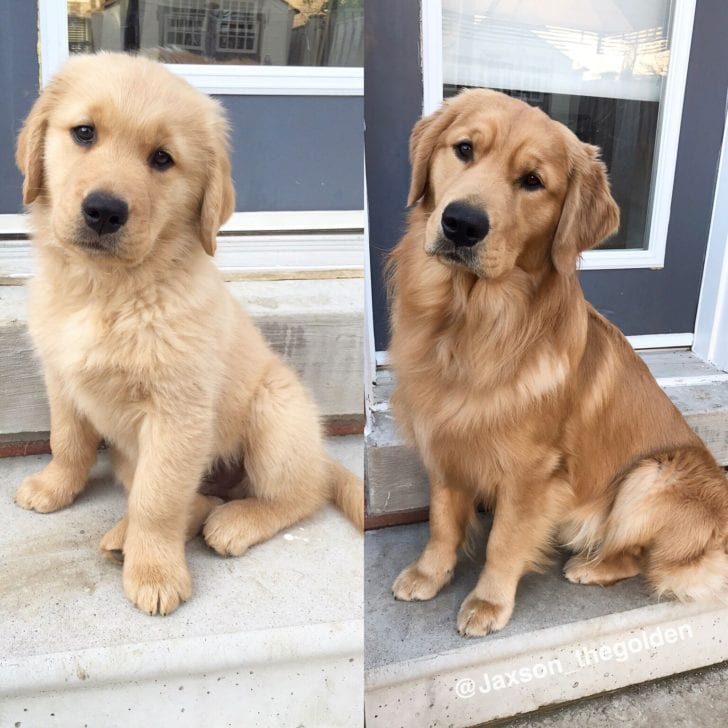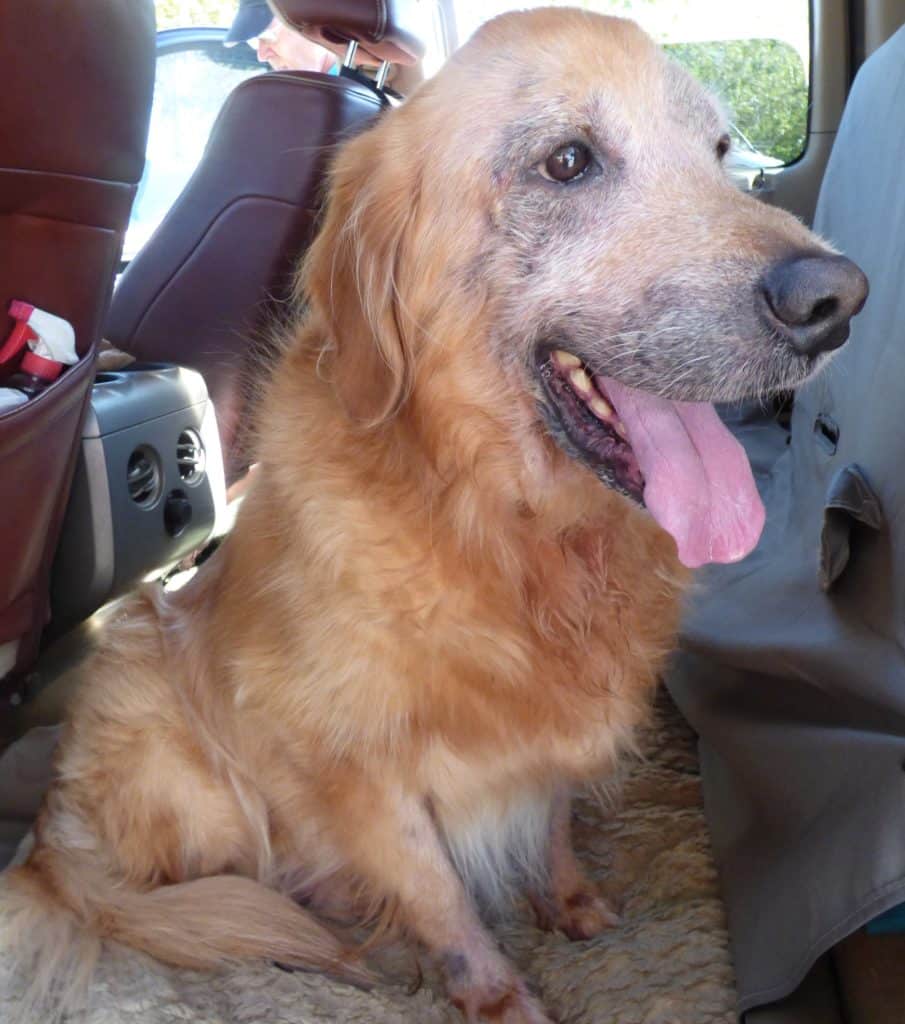Cost Of Itchy And Losing Hair
The cost of treatment will vary depending on the cause of your dogs itchy skin and hair loss. Mange and mites, including fleas, can average about $350 to $600. Other treatments, including bacterial infection, allergic reaction and hormonal imbalance can range in price from $300 to $2500.
Worried about the cost of treating your pet’s symptoms?
Pet Insurance covers the cost of many common pet health conditions. Prepare for the unexpected by getting a quote from top pet insurance providers.
Susceptibility To Skin Allergies
Atopic dermatitis is a heritable condition that some Golden Retrievers develop as an inflammatory reaction to things like tree pollens, grasses, ragweeds, dust, mold and insects such as fleas, ticks and mosquitoes. Food intolerances can also cause skin allergies and gastrointestinal disorders in Golden Retrievers.
Environmental Allergies And How To Treat Them
Golden retrievers, and most other breeds, can suffer with allergen agents. What makes it difficult to spot in golden retrievers though, is their thick coat. It can actually hide any skin reactions they have.
To spot an allergic reaction in golden retrievers, there are some symptoms to look out for. Keep an eye out for:
If left, this can result in infections or eczema forming. So, if you spot anything like the above, its important you speak to your vet. You want to try to narrow down whats caused the issues and start treatment.
The first thing you can do to treat skin allergies is to bath your golden retriever on a regular basis. Every 4 or so weeks should be good for most goldens.
This will help relieve the itchiness. Be careful not to bathe them too often or youll strip the skin of essential oils and dry out the skin further. If after a monthly bath your golden retriever is still itchy, talk with your vet.
When your golden retriever goes out, wipe them down with a damp cloth after. This will remove any allergens from their coat and skin.
That thick coat is beautiful but is also vulnerable to skin irriations
Read Also: Is A Golden Retriever A Labrador Retriever
How Vets Diagnose Alopecia In Dogs
A thorough physical exam by your veterinarian is the single most important step in diagnosing the cause or causes of alopecia. It is seldom a quick fix when it comes to skin disorders in dogs. Your vet will take multiple factors into consideration before determining what diagnostics are appropriate in your dogs case .
Unfortunately, there is no simple recipe to fix alopecia in dogs. Figuring out the cause is essential to choosing treatment options. Also, many causes of alopecia are ongoing conditions that will need periodic medications or other treatments. Understanding this before you even make the vet appointment will go a long way in saving you from frustration if symptoms return in the future.
When seeing your veterinarian, be prepared to answer thorough questions about your dogs history, including:
-
Number of pets in the home
-
Degree of pruritus
-
Parasite medications
-
Prior health issues or blood work abnormalities
Once your vet has these answers, they can examine your pet and determine possible causes. Your vet will check closely for any evidence of fleas or flea dirt , ticks, or saliva-stained areas such as the feet, tail base, and flanks.
They will also note any unusual odors. Yeasty feet smell like Fritos, and ears have unique smells depending on yeast or bacteria. Your dogs skin may have a waxy or greasy feel, which will help decide what topical therapies to use.
How To Identify Hair Loss In Senior Dogs

To get an idea if your senior dog is losing hair because of simple shedding or something more, take a close look at the coat.
- If your dog isn’t showing bald spots or irritated skin, that’s a good indicator that their hair loss is normal, Dr. Plant says.
- On the other hand, if you can grasp a tuft of hair and pull nearly all of the strands out easily, that’s cause for concern.
- Itching, redness and irritation, or bleeding are also signs that something’s not right.
Not sure? You can always ask your veterinarianor even your groomer.
Groomers are often on the front line when it comes to noticing any changes in the pets physical appearance, Conner says. In many cases, groomers see the pet every six to eight weeksfar more frequently than the average pet sees their veterinarian. In addition to this, they see every inch of the pet as they bathe, dry and groom them.
Recommended Reading: Golden Retriever Puppies St Augustine Florida
Wipe Your Dogs Paws And Belly After A Walk
A quick way to reduce irritation from environmental allergens is to wipe your dogs paws and belly before going inside. Keep a gentle pet wipe on hand, like Earthbath Hypoallergenic Pet Wipes.
This wont remove all allergens but reduces the amount that enters your home. It can also stop your dog from spreading allergens across his skin by scratching.
Alternatively, dog boots and raincoats can prevent allergens from coming into contact with the skin. Some dogs dont enjoy wearing these, however, so you may need to use positive reinforcement training to get your pet to accept clothing.
What Can I Do At Home
If you cannot take your dog to the vet for some reason, the first thing to do is check for fleas. If he does not have a flea problem, and his symptoms fit some of the other diseases that I describe above, there are some other things you can try.
- If the problem is seasonal, and you think it might be inhalant allergies, try some natural remedies like raw honey.
- If the ears and GI tract are involved and you think it might be food-related, try a hypoallergenic diet . A raw diet with whole natural proteins is best.
- If the problem seems to be mainly with her feet and belly, a contact allergy might be the problem, and you can try switching the bedding.
- If the problem is hair loss around the nose and lips, get rid of the plastic food bowl and replace it with a ceramic or stainless steel dish.
- No matter what the cause of itching, you can provide some relief by bathing your dog in oatmeal shampoo, and many holistic veterinarians think it is helpful to rinse the dog with apple cider vinegar after bathing.
Also Check: How Much To Feed 12 Week Golden Retriever
Why Itchy And Losing Hair Occurs In Dogs
Mange
Mange is a skin disease that occurs when tiny mites overpopulate the skin, causing irritation. All dogs have some mites on their skin, but during times of high stress, these mites will multiply uncontrollably. Mange can cause patchy hair loss and scaly skin that can be extremely itchy.
Trauma
Depending on the type of trauma, your dog can experience hair loss if they continually lick a specific area. This is called acral lick dermatitis and many dog owners will notice persistent licking of one area that results in skin irritation, skin lesions and hair loss.
Allergic Reaction
Allergic reactions can occur from a variety of sources including food, chemicals, plants and external parasites. Hair loss and extreme itching can occur from certain allergic reactions especially food allergies where the allergic reaction is not diagnosed immediately and the symptoms are more subtle.
Infection
Skin infections can cause red, inflamed skin that is itchy and hair loss can occur. Infections include ringworm, yeast, folliculitis and bacterial. Pus and/or hot spots are usually good indicators that an infection is present.
Hormonal Imbalance
Hormones play a large part in healthy skin and hair, when your dog is experiencing problems with their hormone levels you may notice itching and hair loss. Thyroid and adrenal gland deficiencies can cause problems for your dog, especially hair loss.
Mites or Parasites
Mange And Other Parasites
Mange is a catch-all term for itchy skin infections caused by mites. Mites are microscopic creatures that live on the surface of the skin or in hair follicles. They cause hair loss and itching by burrowing or chewing on skin. Some mites, like the scabies mite, are extremely contagious to both humans and other dogs, notes the Merck Veterinary Manual. Other mites, like demodex mites, aren’t contagious but still cause hair loss and may require treatment.
Fleas are a very common reason for a dog losing hair. Fleas can make dogs itchy to the point of scratching their hair off in places. Mites and fleas are extremely contagious, so any parasites you find on your dog may have already spread to your home and other pets. If you find evidence of mites or fleas, your vet can prescribe an antiparasitic medication and offer tips for ridding your house of pests.
Recommended Reading: How To Keep Golden Retrievers From Smelling
Switch Your Golden Retrievers Food
Dog owners everywhere know that switching your dogs food can be tough, but in the case of golden retrievers who cant stop scratching, it may just be worth it.
Your golden retriever could potentially be allergic to an ingredient or ingredients in his or her food. The most common food allergies in dogs are beef, chicken, dairy, soy, and egg.
In order to figure out what food is going to be best for your pooch, you may have to put him or her on whats called an elimination diet. This consists of feeding your dog things they have never had before and reintroducing their normal food to see if they do indeed have an allergy to that food.
Your veterinarian can approve or disprove this method depending on your dogs needs and may suggest other alternatives.
There are dog foods out there that are formulated to help golden retrievers with skin sensitivities. These foods can help the overall health of your goldens skin and coat and may just alleviate all that itching.
Nutrients like omega fatty acids and borage oil are said to reduce skin inflammation, help the skin maintain its structure, and keep your golden retrievers coat healthy.
Treatment For Excessive Scratching
Treatment for skin severe itching in dogs depends on whats causing the problem, which is why you should always contact a vet for advice.
The good news is that most causes of dog scratching face raw can be successfully treated once your dog has received the correct diagnosis. There are also many ways you can provide relief at home. Here are some of the most common treatments and natural remedies for itching.
Read Also: San Antonio Golden Retriever Rescue
Proliferative Thrombovascular Necrosis Of The Pinnae
Tissue death of the pinna can occur due to blood clots that form within blood vessels. The decreased blood flow to the area causes open sores to form, with scaling, thickening, and darkening of the surrounding skin. Skin changes start at the tip of the pinna and then spread along its inner surface. Medications can help some affected dogs, but surgery to remove the diseased tissue may be necessary. The cause is unknown.
Supplement Your Dogs Diet With Omega

Itching caused by inflammatory conditions can sometimes be helped by supplementing omega-3 fatty acids. Omega-3 has anti-inflammatory properties that can provide significant relief – and may even reduce the need for antihistamines.
The dose required varies depending on a dogs size, diet, and breed. For this reason, you should discuss omega-3 with your vet before giving it to your dog.
To learn more about Omega 3 supplementation, check out 10 Benefits of Omega-3 Fatty Acids in Your Pets Diet.
Also Check: Best Canned Dog Food For Golden Retrievers
Why Is My Golden Retriever Scratching So Much
As a golden retriever owner, youve likely experienced at seen at least some scratching from your pup. Dogs can get itchy just like humans can, and it can be difficult and irritating in more ways than one to try and figure out just why your dog might be scratching.
Why is my golden retriever scratching so much? Your golden retriever may be scratching so much because golden retrievers store a lot of heat and humidity right next to their skin due to their undercoats, which leads to itchy hot spots. Golden retrievers are also prone to skin allergies like atopic dermatitis.
Youve got questions about why your golden retriever seems to be so itchy, and weve got answers! Well walk you through the big reasons why your golden retriever could be scratching and let you know ways to manage it so your pup can stay happier and scratch less.
Try A Low Allergy Diet
Switching your dog to a different food brand often isnt enough to relieve an allergic reaction. Allergies are caused by a specific ingredient in the food, which may be present in another brand.
Instead, youll need to switch to a limited ingredient food, preferably using a protein that your dog hasnt eaten in the past. Raw diets are a great example of a limited ingredient, low allergen diet. You can select a diet with minimal processing and few nutrient-dense ingredients.
If your dogs scratching doesnt improve on a low allergy diet, he may be allergic to something in his environment. An allergy test can sometimes help determine whats causing the problem, but limiting exposure to allergens like smoke, perfumes, and air fresheners may provide some relief.
Check out Food Allergies in Dogs for more information about how to find the right diet to stop itching and make sure your dog gets a complete and balanced diet.
Don’t Miss: Reputable Golden Retriever Breeders Florida
More About Your Dog’s Skin
- Honey, Herbs and Other Natural Ways to Treat Skin AllergiesIn holistic veterinary medicine symptoms like itchy skin and allergies to flea bites are considered to be caused by poor quality food, over vaccination, and continual exposure to toxins in the environment. These are some alternative treatments.
This article is accurate and true to the best of the authors knowledge. It is not meant to substitute for diagnosis, prognosis, treatment, prescription, or formal and individualized advice from a veterinary medical professional. Animals exhibiting signs and symptoms of distress should be seen by a veterinarian immediately.
How To Treat Senior Dog Hair Loss
The first step toward treating senior dog hair loss is figuring out what is causing it by taking your dog to the veterinarian for an exam. The vet will take a comprehensive history, asking you questions about the dogs symptoms.
Screening for hormonal diseases will include a blood panel, Dr. Plant says. The veterinarian may also review the dogs nutritional status.
Depending on your dogs symptoms, other tests might be recommended.
Once the cause of an old dog losing hair has been identified, they might be treated in a variety of ways:
Also Check: What Do Golden Retrievers Like To Do
Try Apple Cider Vinegar
Apple cider vinegar is one of those old home remedies that people have been using for many, many years.
So what makes it such a great thing to apply to your dogs skin & hair?
Well, apple cider vinegars acidic nature makes it a natural antifungal & antibacterial. That means you can apply it to any irritated skin to help clean out any of the bad stuff.
You can either dab it on your dogs skin, or try adding some to their bath and use it to refresh their skin all over their body.
Help Your Pet Lose Weight And Get In Shape
Miracle Vet High Calorie Dog Food For Weight Gain 48,000 kcal
One of the most common problems with dog hair loss is dry skin & hair.
And one of the best ways to combat that? Get a humidifier!
A humidifier will keep more moisture in the air, soothing your dogs skin and preventing that dry, itchy skin.
The best place to put your humidifier is near your dogs bed.
Also Check: Best Dry Food For Golden Retrievers
Infections That Cause Your Dog To Itch
- Hot spots are a local infection that usually starts under a patch of thick hair. If you know what they look like, and want to take care of the infection at home, you can clip the hair, clean the skin with betadine from your first aid kit, then apply a topical antibiotic cream from your drugstore. Your vet might put your dog on oral antibiotics too, and might give him a shot of steroids to keep her from scratching the spot and making the infection even worse.
- Folliculitis is an infection of the hair follicles. Some dogs can have this infection by itself but many times it is secondary to other infections like mange. The dog can be treated at home with twice daily Pyoben shampoos, but your vet may need to put him on oral antibiotics.
- Cellulitis is an infection of the skin and tissue just underneath. Like with folliculitis, there is not always hair loss, but since it is painful your dog might rub it and the hair will come off. Treat it by soaking in Epsom salts and keep the skin above the infection clean with betadine. If this is not enough your vet may want to treat your dog with antibiotics.
What Is Seasonal Flank Alopecia

Seasonal flank alopecia is a skin condition of dogs that typically occurs during the winter months. Affected dogs lose patches of hair, without any other significant evidence of skin disease. Seasonal flank alopecia typically begins in early adulthood and often continues on a yearly basis throughout the rest of the dogs life.
“Affected dogs lose patches of hair, without any other significant evidence of skin disease.”
Breeds commonly affected include Boxer Dogs, Airedale Terriers, English Bulldogs, French Bulldogs, and Schnauzers. Seasonal flank alopecia is also seen in other breeds, although less commonly.
You May Like: How To Clean Golden Retriever Ears